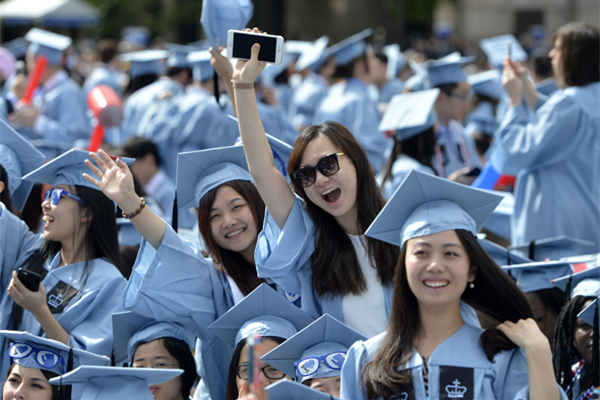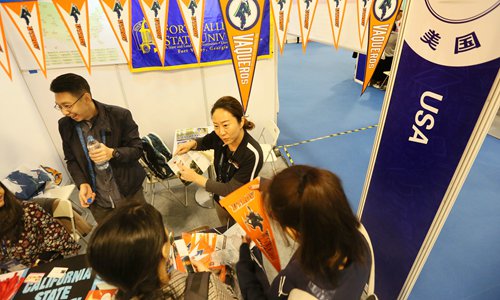
This is People's Daily Tonight, your news source from China.
_____
Chinese students overwhelmed by soaring US university tuition fees

Overseas students from China celebrate their graduation from Columbia University on May 20, 2015. (Photo: China Daily)
Paying for education is expensive. As tuition fees for foreign students have risen substantially in recent years, many Chinese students at US universities and colleges are feeling the pinch and are unhappy about it.
Soaring tuition, major burden
USNews data shows that the top 50 private universities in the US increased their 2017-2018 tuition fees by an average of 3.6 percent, while the figure for some schools exceeded 4 percent.
For many non-American students, tuition fees can range from around $27,000 to more than $70,000 per year.
Joyce, a Chinese student at the University of Southern California (USC), complained that each year she had to pay more to stay on campus.
"I attended USC in 2014. The tuition fees have kept increasing ever since. I think that's one of the reasons that fewer international students come here," she said.
Instead of being the stereotypical “rich kids” as often depicted in media reports, most Chinese students at US universities are from middle-class or upper middle-class families, meaning the soaring tuition fees alone are a major burden for them and their families, not to mention living expenses including rent and health insurance.
According to "China's Working Class Credit Development Report", a financial survey covering 40,000 Chinese families, the average annual income of working people in China reached 154,000 yuan (around $22,075) in 2017.
Most Chinese parents prepare for the tuition fees and other expenses by scrimping and saving. A Chinese parent, who spends about $90,000 a year to send her daughter to Boston University, said she sold construction industry equipment for 10 years to save for her daughter's schooling.

Parents consult with admission officers from US universities at the China International Education Exhibition in Beijing in October. (Photo: Global Times)
More investment, less profit
Meanwhile, US universities and colleges have raised their standards, making it harder for foreign applicants to get admitted, even though they have the same experiences and TOFEL or SAT scores as their American counterparts.
In addition to the shrinking international admission, the H1-B sponsorship becomes more restrictive due to the immigration policy initiated by the administration of Donald Trump.
The restrictions are having a great impact on Chinese students, because many of them come to the United States not only for study, but for a full time job after graduation.
Therefore, more and more Chinese students return to their home country instead of risking the slim chance of finding a job in the US.
In line with the influx of those foreign graduates into China’s labor market, Chinese employers are now more discerning of the candidate pool available.
Some researchers believe that the Chinese market and its employers can now distinguish overseas students with strong experiences from strong programs from those who are just there from a mediocre program and not working hard to benefit from their stay abroad.
The Chinese graduates from American universities are not as guaranteed well-paid jobs as they used to be.
It’s just like what a Chinese student in Texas said, “you invest more, and you are getting less.”
The huge gap between investment and profit may cause some psychological issues, even depression.
In summary, the outcome of investing in American education is no longer as simple as it was for Chinese students and their families. When applying to a US university, Chinese parents have to be “more calculative” and much more aware of the skyrocketing costs associated with tertiary education in the States.
_____
And that’s People’s Daily Tonight. Thanks for joining us.
(Produced by He Jieqiong; text from People's Daily app)


